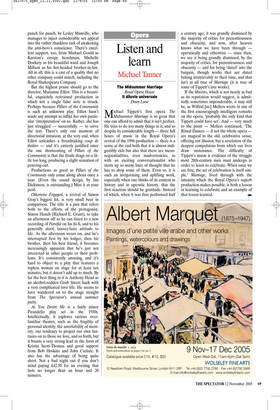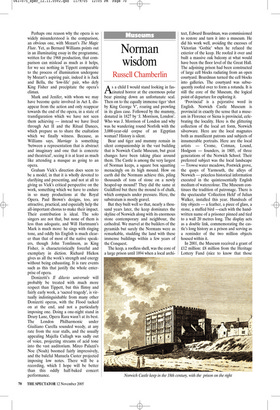Listen and learn
Michael Tanner
The Midsummer Marriage Royal Opera House Il diluvio universale Drury Lane Michael Tippett’s first opera The Midsummer Marriage is so great that one can afford to admit that it isn’t perfect. He tries to do too many things in it, and so despite its considerable length — three full hours of music in the Royal Opera’s revival of the 1996 production — there is a sense at the end both that it is almost indigestibly rich but also that there are inconsequentialities, even inadvertencies, as with an exciting conversationalist who starts up so many lines of thought that he has to drop some of them. Even so, it is such an invigorating and uplifting work, especially when one thinks of its context in history and in operatic history, that the first reaction should be gratitude. Instead of which, when it was first performed half a century ago, it was grandly dismissed by the majority of critics for pretentiousness and obscurity, and now, after heaven knows what we have been through operatically and otherwise — since then, we see it being grandly dismissed, by the majority of critics, for pretentiousness and obscurity — and for being ‘dated’ into the bargain, though works that are dated belong irretrievably to their time, and that isn’t at all true of Marriage (it is true of some of Tippett’s late works).
If the libretto, which is not nearly as bad as its reputation would suggest, is admittedly sometimes imponderable, it may still be, as Wilfrid [sic] Mellers wrote in one of the first encouragingly intelligent remarks on the opera, ‘probably the only kind that Tippett could have set’. And — very much to the point — Mellers continued, ‘The Ritual Dances — if not the whole opera are magical in the old, celebrative sense, offering not illusion, but a revelation of the deepest compulsions from which our lives draw sustenance. The difficulty of Tippett’s music is evidence of the struggle most 20th-century men must undergo in order to learn to celebrate. When once we are free, the act of celebration is itself simple.’ Marriage, lived through with the intensity which the Royal Opera’s superb production makes possible, is both a lesson in learning to celebrate and an example of that lesson learned. Perhaps one reason why the opera is so widely misunderstood is the comparison, an obvious one, with Mozart’s The Magic Flute. Yet, as Bernard Williams points out in an illuminating essay in the programme, written for the 1968 production, that comparison can mislead as much as it helps, for we see nothing in Tippett comparable to the process of illumination undergone by Mozart’s aspiring pair, indeed it is Jack and Bella, the ‘low-life’ pair, who defy King Fisher and precipitate the opera’s climax.
Mark and Jenifer, with whom we may have become quite involved in Act I, disappear from the action and only reappear towards the end of the opera, in a state of transfiguration which we have not seen them achieving — instead we have lived through Act II and the Ritual Dances, which prepare us to share the exaltation which we finally witness. Because, as Williams says, Marriage is something ‘between a representation that is abstract and imaginary and one that is concrete and theatrical’, seeing it is at least as much like attending a masque as going to an opera.
Graham Vick’s direction does seem to be a model, in that it is wholly devoted to clarifying and presenting, and not at all to giving us Vick’s critical perspective on the work, something which we have to endure in so many productions at the Royal Opera. Paul Brown’s designs, too, are attractive, practical, and especially help the all-important chorus to make their impact. Their contribution is ideal. The solo singers are not that, but none of them is less than adequate, and Will Hartmann’s Mark is much more: he sings with ringing tone, and oddly his English is much clearer than that of most of the native speakers, though John Tomlinson, as King Fisher, is characteristically forceful and exemplary in diction. Richard Hickox gives us all the work’s strength and energy without being exhausting. It is rare events such as this that justify the whole enterprise of opera.
Donizetti’s Il diluvio universale will probably be treated with much more respect than Tippett, but this flimsy and fairly early work, a ‘sacred tragedy’, is virtually indistinguishable from many other Donizetti operas, with the Flood tacked on at the end, and not a particularly imposing one. Doing a one-night stand in Drury Lane, Opera Rara wasn’t at its best. The London Philharmonic under Giuiliano Carella sounded weedy, at any rate from the rear stalls, and the usually appealing Majella Cullagh was sadly out of voice, projecting streams of acid tone into the vast auditorium. Mirco Palazzi’s Noe (Noah) boomed fairly impressively, and the baleful Manuela Custer projected imposing low notes. There will be a recording, which I hope will be better than this oddly half-baked concert performance.




























































 Previous page
Previous page